Two years into her role and with four films in Cannes’ official selection, BBC Film director Eva Yates reflects on challenges, opportunities and her leadership vision for the UK public-funding pillar.
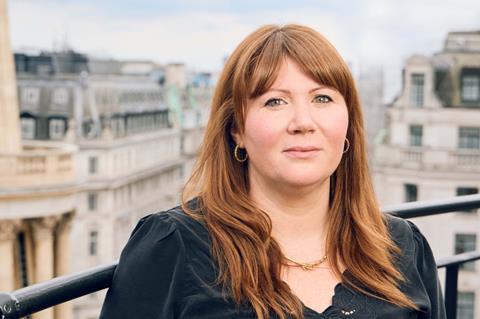
It was just before Cannes two years ago that Eva Yates was confirmed as the new director of BBC Film in the wake of Rose Garnett’s departure to join A24. And with four films in official selection at this year’s festival and a slate of buzzy projects in the development and production pipeline, she is now ready to sit down for her first in-depth interview.
Yates has had some stern challenges to deal with in her first two years, aligned with threats to the entire independent film ecosystem in the UK.
“When I landed in the job, the sector was not in a good place,” she says. “We had a ripe slate of projects and a lot of them were facing difficulties because of the state of the industry. All of the things that have made it so much more costly and difficult to make films, the way the value chain has shifted, were compounding into a situation where films that used to be quite easy to get across the line and would clearly have good market potential suddenly were finding it difficult.”
The projects being hit hardest and requiring the most firefighting will come as no surprise to the UK industry: features in the £7m-£10m ($8.8m-$12.5m) budget range with good cast and strong stories but still facing a substantial gap in finance beyond what BBC Film and other UK funding sources could offer.
Two years on, Yates is seeing rays of hope again for this type of project, fuelled in part by the arrival of the Independent Film Tax Credit. (BBC Film-backed titles that went into production the year she took the reins include One Life, The Outrun starring Saoirse Ronan, which premiered at Sundance in January, The End We Start From and The Iron Claw.)
“I hope we see a shift in that because they are the films that can really break through,” she says. “It feels much more robust now and we’ve had some really competitive, exciting situations on projects that have gone out recently. Two years ago we were not in that place at all.”
Rise to the top
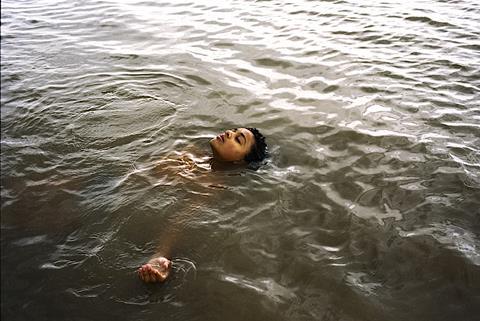
For someone who had spent her formative career years in creative development, it marked a big shift for Yates to step up to the decision-maker role at BBC Film. Yates’s rise to her position has seen her working under, and being mentored by, some of the most experienced women in the UK film business: producer Kate Ogborn at Revolution Films, where she got her start in production and development; Tanya Seghatchian at the UK Film Council; and Tessa Ross and Garnett at Film4, where she worked for eight years before joining BBC Film in 2017.
Yates’s team is nearly all women, including commissioning executives Claudia Yusef and Kristin Irving, who joined from the BFI in 2022; development executives Anu Henriques and Alice Ojha; and new recruit Anwen Griffiths, who joined in April from Lee & Thompson as head of legal and business affairs, replacing Geraldine Atlee who has moved to a wider role at the BBC. (A further 10 people work in supporting roles across production, finance, marketing and publicity.)
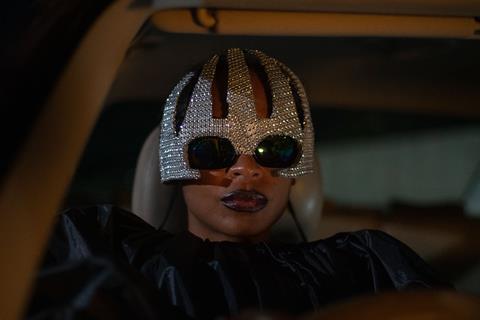
The day before meeting Screen International, the team had screened Sandhya Suri’s Santosh, which will premiere in Un Certain Regard. The other BBC Film-backed films in Cannes official selection are Andrea Arnold’s Competition title Bird and Rungano Nyoni’s On Becoming A Guinea Fowl and Ariane Labed’s September Says, which are both in Un Certain Regard.
“I’m in the industry because I loved Andrea Arnold films, I loved Lynne Ramsay films, I loved the works of so many British filmmakers,” says Yates. “The fact we can offer something meaningful to those filmmakers to keep making that work is about as good as it gets. And beyond that, it’s about trying to figure out who’s not in the industry who should be, and how you put them on a path that allows them to keep going and be ambitious and say what they want to say.”
When Yates followed Garnett from Film4, her specific remit was working across new talent, including overseeing now-disbanded micro-budget schemes iFeatures and Microwave. When she landed the top job, Yates recognised that maintaining BBC Film’s position as “a place of stability” was crucial. She has not radically altered the strategic approach, which includes an ambition to help 12 to 15 projects get made each year, and making sure the UK’s new-talent pipeline remains strong by backing debut features and bringing through more underrepresented voices.
What has shifted under Yates is how films are discussed by the team (“looking at how producers put things together from the beginning”), as well as a constant review of the slate: “I’m constantly thinking about what’s on it and what’s not.” Yates has introduced a colour-coded spreadsheet of the slate that displays and orders the frontrunners for production across the next few years, to help add momentum to projects, aid decision-making and always keep the balance of projects front of mind for the team.
She has also prioritised more support for filmmakers as they move from their first to their second, then third features, to help build careers. The development slate includes the second features of His House filmmaker Remi Weekes, to be produced by Seghatchian and John Woodward’s Bright Star (“it’s not a horror”); Rye Lane writer/director Raine Allen-Miller (“a comedy with a fantastic script by Raine”) produced by Damian Jones; Charlotte Regan (Scrapper); Georgia Oakley (Blue Jean); Aleem Khan (After Love); Tom Hardiman (Medusa Deluxe); Sam H Freeman (Femme); and Mahalia Belo (The End We Start From).
“As a team we all feel strongly that we don’t want to drop people out in the world and then for them not to know where to go next,” Yates says.
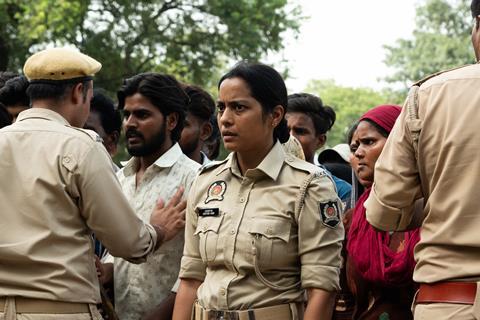
“Our fundamentals will always be the same,” she adds. “Every project we look at, we think, ‘Does it do something for a BBC audience and a broader audience; does it do something for film culture, or wider culture; and what does it mean to support that film within the context of the industry?’ Those three things are weighted in different ways on different projects but those are the three parameters we’re always moving around.
“If a film can go out and get made without our support and they won’t have a benefit from being with us, then that’s not the best way for us to spend our money. We should use it where it can be of greatest benefit.”
BBC Film’s annual budget remains static at $14m (£11m) including overheads, a figure that has not changed for more than a decade (in line with the corporate parent’s own budgetary stasis). In real terms, with inflation, that equates to an approximate 30% decline. It is why investing in development continues to be prioritised.
“Development is the way we make our money meaningful,” says Yates. “We don’t have the scale of budgets that others have but we can provide the part of the process that allows producers to bring other investment in. We know it’s where we can have a significant impact.”
The majority of production finance is allocated to projects that come through the development pipeline, and BBC Film funding spans the spectrum from being the majority financier to a tiny minority partner. While investments can be seven figures, Yates prefers to keep exact levels opaque in order to retain flexibility from project to project.
Hailed across the industry, the introduction of the Independent Film Tax Credit in March offering approximately 40% tax relief on UK film productions up to $19m (£15m) will, hopes Yates, allow for more films to be made “at the top end of that bracket” — and have more of those projects built out of the UK. “We’ve done a lot of those films and often we’ve had to take US money.”
But Yates also cautions the indie tax credit will not solve all of the industry’s problems and should “be part of a suite of bigger resolutions for the industry as a whole. It only tackles one part of the value chain although it has lots of knock-ons.”
A talking point among some in the UK industry has been whether the new credit would give public funders an excuse to lower the threshold of their investments, thereby dissipating some of the advantages for producers. “We were vocal about our support for the tax credit to change because we wanted to see benefit in the industry. Our investments will not reduce as a result of it,” insists Yates. “I hope it makes an impact but we don’t intend to change the way we work in any way that would influence the scale of impact that it could have.”
Immediate impact
Yates reports it is already having a bearing on some BBC Film-backed projects: “Gaps in finance plans have disappeared. We’ve been able to close deals with some actors we really wanted for projects. We are seeing immediate, exciting benefits. And I can see an energy in producers. It has accelerated some people wanting to move towards production because they feel a greater sense of possibility.”
As for the question of deferrals, and what BBC Film is doing to protect producers from these, Yates states: “We do not ever want deferrals on any of our films. We do not like it. So I hope the tax credit will be another way to avoid them happening. It’s a long-term, industry-wide conversation and there needs to be a resolution to it.”
The development slate contains “over 100” projects, according to Yates, across all genres. As well as the expected dramas, “we’ve got some good horrors, we’ve got some thrillers, and we’ve been doing a lot of work around comedy. There’s an incredible comedy tradition in the UK and it’s a long-term frustration that there’s not more comedy coming through.”
Also on the horizon are the debut feature of Akinola Davies, produced by Rachel Dargavel for Element Pictures (BBC Film produced his Sundance-winning short Lizard), and Superbabe, Stacey Gregg’s follow-up to her first feature Here Before and based on Louise Brown’s book about being the world’s first ‘IVF baby’, produced with SunnyMarch.
Garnett famously took a broom to the slate when she arrived, and while Yates has not taken the same approach there are always projects that stall — “and the question gets asked whether we’re the right home for it”.
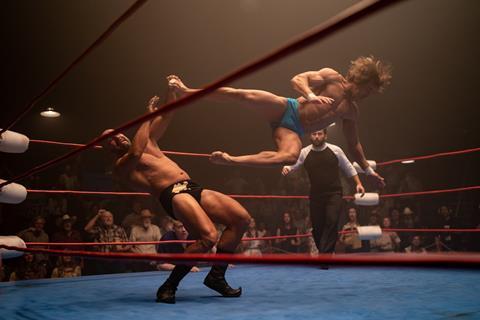
Given it is public money, there will always be scrutiny too around which projects do receive meaningful support, among them recently The Iron Claw, Sean Durkin’s drama about a US professional wrestling family starring Zac Efron, which BBC Film co-financed with A24. Yates points out they had also supported Durkin’s previous film The Nest, the project had UK producers (Tessa Ross, Juliette Howell and Angus Lamont), and there is a remit to support more global work with the BBC’s broadcast audience in mind.
“We are an end user, sometimes people forget that, and what we bring to the BBC to play on the channels is also important,” says Yates. “There’s a balance between what we might do in the US, the current need in the UK, and what’s happening across Europe. All film should be existing in a global space.”
BBC Film has a longstanding relationship with A24, which bought US rights to BBC Film-backed projects including In Fabric and Aftersun and, as well as The Iron Claw, is a co-financing partner on Nyoni’s Cannes selection and Daina O Pusic’s upcoming debut feature Tuesday, starring Julia Louis-Dreyfus.
Element Pictures is also a frequent partner, as is the BFI. Recent collaborations with the latter include Naqqash Khalid’s In Camera, Johnny Barrington’s Silent Roar, Luna Carmoon’s Hoard and Daniel Kokotajlo’s Starve Acre. But a reduction in the amount of finance the BFI is able to provide has prompted searches for other partners, with Yates excited about new US equity partners First Gen and Pinky Promise, which both came on board as backers for Bird.
Maintaining existing relationships and looking to forge new ones is now a big part of Yates’s day. She needs to always have the bigger picture in mind, manage her division’s relationship to the wider BBC including with other commissioners, take the lead on the industry policy work that has occupied headlines of late, and keep an awareness of how BBC Film sits within the UK industry.
Being in the trenches with filmmakers remains a key part of her role, however — and one she never wants to lose, even if “I can do it a little bit less than I used to”. When asked what she sees as her own strengths when it comes to working with talent, she replies, “I’m a very honest person and tell people what I think, but I try to do that in a way which is productive. If you’re sitting on the same side of the table making something better, as opposed to sitting on the opposite side of the table telling them something they don’t want… I’m always trying to sit on the same side of the table as the filmmakers.
“That means also sometimes you have to have difficult conversations, or you end up being the one who’s expected to deliver difficult news. But I don’t mind doing that because we have an obligation to ensure we’re supporting people to make things as good as possible. If I can see something could be better, I want to make sure I’ve not left anything unsaid.”
FACT FILE: BBC Film
Annual budget: $14m (£11m)
Team size: 16
In the pipeline
The Choral - Pre-production
Dir. Nicholas Hytner
Starring: Ralph Fiennes, Jim Broadbent
Prods: Nicholas Hytner, Kevin Loader, Damian Jones
Key partners: Sony Pictures Classics (worldwide distributor), Screen Yorkshire
Christy* - Post-production
Dir. Brendan Canty
Prods: Rory Gilmartin, Marina Brackenbury, Meredith Duff
Key partners: Screen Ireland
Dreamers* - Post-production
Dir. Joy Gharoro-Akpojotor
Prod: Emily Morgan
Key partners: Quiddity Films, The Yellow Affair (sales), Newen Connect
The Fall Of Sir Douglas Weatherford* - Post-production
Dir. Sean Dunn
Prods: Alex Polunin, Scott Macaulay, Jennifer Monks
Key partners: BFI, Screen Scotland, Mubi, Charades (sales)
Hamlet - Post-production
Dir. Aneil Karia
Starring: Riz Ahmed
Prods: Riz Ahmed, Allie Moore, Michael Lesslie, James Wilson, Tommy Oliver
Key partners: WME Independent (sales)
Harvest
Dir. Athina Rachel Tsangari
Prods: Rebecca O’Brien, Michael Weber, Viola Fügen, Marie‑Elena Dyche, Joslyn Barnes
Key partners: Ashland Hill Media Finance, The Match Factory
Never Seen The Sea* - Pre-production
Dir. Stroma Cairns
Prods: Imogen West, Kelly Peck
On Falling* - Post-production
Dir. Laura Carreira
Prod: Jack Thomas-O’Brien, Mario Patrocinio
Key partners: BFI, Screen Scotland, Sixteen Films, Goodfellas
The Salt Path - Post-production
Dir. Marianne Elliott
Prods: Elizabeth Karlsen, Stephen Woolley, Lloyd Levin, Beatriz Levin
Key partners: Number 9 Films, Lipsync, Rocket Science, Black Bear (UK distributor)
Untitled Harris Dickinson project* - Pre-production
Dir. Harris Dickinson
Prods: Archie Pearch, Scott O’Donnell
Key partners: BFI, Tricky Knot
*Feature debut

























No comments yet